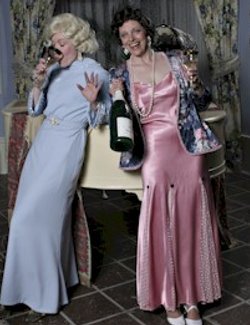
North York Mirror
Two middle-aged women, locked in comfortable though passionless marriages, contemplate a dalliance with French lothario who romanced them both some years before their descent into domesticity. That's the slight premise of Noel Coward's rarely performed 1927 comedy Fallen Angels, the first production of the new season of plays presented by Stage Centre Productions at the Fairview Library theatre.
Even at this early stage in his career, Coward shows his fine ear for dialogue and once again proves he is the master of the caustic riposte. The play, while lacking in serious subtext, provokes one key emotion: laughter!
The leading ladies provide much of that laughter, particularly Judy Gans as Julia Sterroll, a dutiful wife whose five-year marriage has somehow lost its romance. Required to be onstage virtually the entire play, Gans makes her character totally believable, enunciates the wordy speeches with perfect clarity without neglecting a single laugh.
Matching her laugh for laugh is Bonnie Gray as Jane Banbury, Julia's longtime friend and confidant. In the second act the two ladies, waiting for their former lover to arrive, dip into the supply of champagne, which serves to loosen tongues and nearly tears their long-standing friendship asunder. Playing inebriated scenes is always a difficult task but the actresses make it work, sending insults back and forth with precision.
Dani Holden as Saunders, the maid whose background seems to include a bewildering array of assignments, very nearly steals the show with her many brief, but welcome appearances. The men appear only briefly in Act 1 and Act 3. Despite having limited stage time, Lawrence Stevenson and Scott Griffin were amusing as the long-suffering husbands and Paul Love made a properly dashing French lover in his brief scene near the end of the play.
Director James Pinhorn keeps the action moving briskly at all times avoiding the pitfall of becoming static during long scenes where just the two leads are onstage conversing. [Webmaster's note: the actual director of this production is L. Garth Allen; James Pinhorn was the Music Director]
Here he is aided considerably by the scenic design. The large open set is designed to offer several good playing areas that serve the comedy well. The costumes have the proper period detail and adding to that there is good use of Coward recordings at the start and end of the production.
There is more good news: The Fairview Library theatre has been completely refitted with new comfortable seats. It looks wonderful, while retaining the excellent sound and site lines for which it is known.